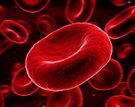
You've probably given blood at least once in your life because of the ongoing need for it. But blood has to be refrigerated and checked for infectious diseases. Getting it to sites of natural disasters, war zones, and impoverished rural locations is challenging. So, for eighty years, scientists have strived to develop an artificial blood substitute and one group is getting close.
They're re-engineering the hemoglobin molecule to overcome a major problem faced by other researchers which is to make an artificial hemoglobin that isn't toxic to the body. Hemoglobin is the molecule in red blood cells that binds to oxygen and delivers it to cells around the body. When hemoglobin is outside the protective environment of red blood cells, it breaks down quickly and is quite toxic.
That's why scientists who've tried to infuse artificial hemoglobin, called HBOCs or hemoglobin-based oxygen carrier, the body's system to process the molecule is overwhelmed. These free HBOCs cause people to develop jaundice, experience liver and kidney damage, and fatal heart attacks.
The new method is able to avoid toxicity by introducing into the artificial hemoglobin, specific amino acids, the building blocks of proteins, in an effort to detoxify it. So far the approach is working since these HBOCs are far less reactive. This HBOC doesn't need refrigeration, can be given to all blood types, and wouldn't be at the mercy of willing donors. With fewer people donating blood, supply will become an issue. With forty million blood transfusions worldwide, the development of artificial blood will become a necessity.
More Information
Quest for long-lasting blood: Scientists developing one-size-fits-all artifical blood
Science Daily — A team of scientists at the University of Essex are hoping to develop a one-size-fits-all, third generation artificial blood substitute.
Artificial Blood Is Patient-Ready
The Scientist — In the midst of news that engineered organs are being implanted into animals and people, researchers announce the creation of artificial blood for transplant.
HaemO2 - Creating a Safe Blood Substitute for the 21st Century
The researchers' website about the project at the University of Essex, UK